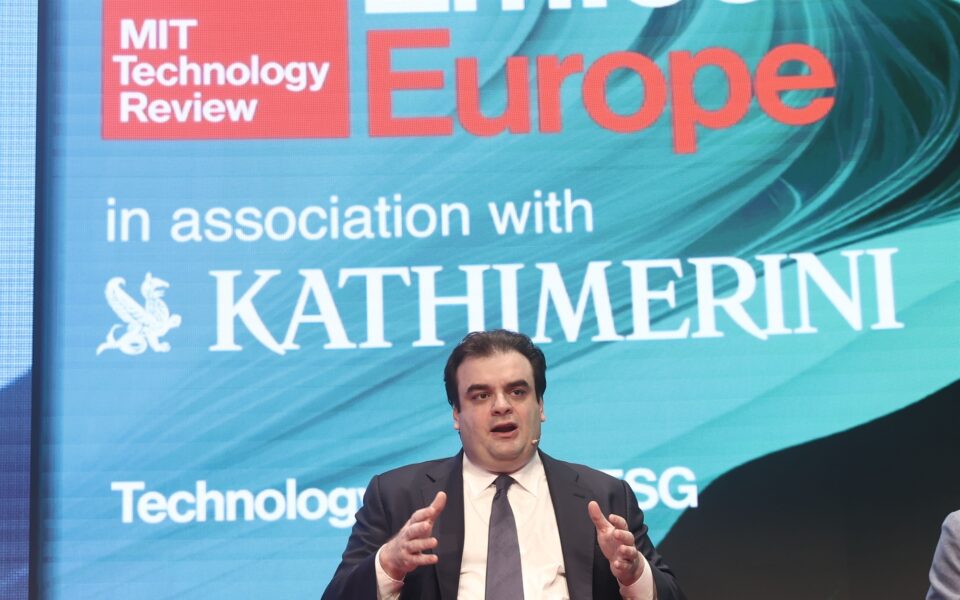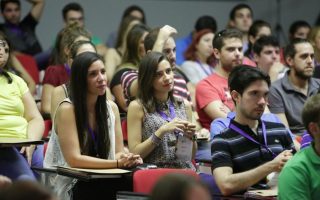No breaks on the path of radical reform
Education Minister can’t wait to shake up the university system after winning the battle of digital governance

It took him just nine months in office in his first-ever term in government to score his first big win as head of the ministry responsible for bringing Greek bureaucracy into the digital age. This time around, as minister of education since June, it looks like his first major win in that post will come a bit sooner.
Now, with a draft bill establishing private, nonprofit universities without amending the controversial Article 16 of the Constitution heading to Parliament in February, Kyriakos Pierrakakis has been thrust back into the public spotlight as he prepares to do battle with one of the most ideologically charged issues of the post-dictatorship era.
As digital governance minister, Pierrakakis enjoyed a certain amount of hard-to-come-by immunity from the fire of the opposition; now he will be facing its full force as he takes on a totem of Greek statism.
He appears nonplussed at the prospect when Kathimerini meets him during the weekend lull at his “hideaway” in Menidi, the home where his wife, Dimitra, grew up and where they’re now raising their three children.
Pierrakakis is often amused by the surprise his address evokes in people who expect a Harvard and MIT graduate like himself to live in Athens’ more affluent northern or southern suburbs. Even friends have tried to convince him to move to a more “chic” part of town. He is adamant about staying and often drives the point home by treating his friends to a takeaway dinner from Menidi’s best gyros joint. “At least I don’t order the mutton, even though it is a speciality in this area,” he says in the sardonic tone his closer acquaintances know so well.
Having graduated from the private Leonteios School and grown up as an only child in a solidly middle-class family with a doctor father and a lawyer mother in Athens’ Kato Patissia district, Pierrakakis is definitely bourgeois. However, constant points of reference, such as his ancestral roots in Mani, in the southern Peloponnese, and that his grandfather and namesake was a truck driver, are evidence the Pierrakakis family is a typical example of social mobility.
How he became an “IT guy” is a different matter. “I’d say that my parents discouraged rather than encouraged me from following their career paths. They had a healthy desire to see me make my own way in life and informational technology was one of my four big great passions as an adolescent,” he tells Kathimerini. Basketball, cinema and, from high school on, politics were the other three.
Basketball soon gave way to politics, a seed planted in his young mind in the 1980s and 90s as he listened to his Maniot grandfathers – one a centrist and the other a conservative – arguing at the dinner table. He has vivid memories of those political debates and from the incredibly polarizing elections of 1989 (even though he was just 6 years old at the time), taking in notions and ideas from both worlds. His own political journey (which began with Anna Diamantopoulou and Evangelos Venizelos of socialist PASOK before he became a minister in Kyriakos Mitsotakis’ center-right government for the first time in 2019) was also shaped by his idols, Eleftherios Venizelos and Konstantinos Karamanlis. Paris also defined him, he says.
‘Ideal’ timing
It was in the French capital in 2014 that Pierrakakis, as a member of the Greek team negotiating the bailout terms with the country’s creditors, met Mitsotakis, who was then minister of administrative reform. The chemistry between the two was “excellent” right from the start, he says.
‘The fundamental goal is to stop Greeks from going abroad to study. The second is to bring more foreign students to Greece’
After the elections of 2015, he took a time-out from politics to get married and start a family, and worked as head of research at the influential Dianeosis think tank before his work there brought him back into the sphere of Mitsotakis, who, in the meantime, had been elected president of New Democracy.
Mitsotakis relied heavily on Dianeosis’ findings on hot-button political, economic and social issues when he was formulating the program of his “new” New Democracy ahead of the 2019 general elections, and Pierrakakis worked with him as a kind of unofficial consultant.
“I was lucky because the timing was ideal,” says the 41-year-old minister. “And I confess that I was impressed. He [Mitsotakis] analyzed Dianeosis’ studies even better than we did. What I remember most, however, was how specific he was about the milestones he wanted to achieve at given times. He had closely studied the tenures of Eleftherios Venizelos, Konstantinos Karamanlis, Kostas Simitis and that of his own father [Konstantinos Mitsotakis, Greek PM from 1990 to 1993], and planned what he would do as prime minister. He was interested in what would remain after his tenure and this is what drew me to him. You see, he was more interested in doing something than becoming something,” says Pierrakakis.
But what is the “something” Pierrakakis is trying to achieve in the weeks ahead with the legislation establishing non-state universities through local branches of foreign tertiary education institutions? The education minister insists on the practical aspects of the legislative intervention. “It’s not an ideological fixation. The country needs to fulfill its educational destiny,” he stresses.
“The fundamental goal is to stop Greeks from going abroad to study. The second is to bring more foreign students to Greece, with public universities at the core of the plan, but also private ones, and the third goal is to turn the country into an international regional education center that will require institutions of different speeds and levels,” he adds.
Even though he is fundamentally a political animal, Pierrakakis also loves solving a good problem. And this lies at the root of the initiative. “Are we trying to wage ideological war or address a problem? And the problem is the 40,000 Greeks studying abroad. Of those, 5,000 are in the United States, Britain and the Netherlands, and they are there by choice. The remaining 35,000 left due to necessity. They couldn’t get into a pharmacology school here so they went to the Czech Republic, for example. So, as a country with a delusion of state control and a system of only ostensible equality that presupposes borders which don’t exist, you lose all these people. In short, we’re trying to solve a problem, and we will solve it.”
Pierrakakis designed the proposals based on preparations that began in between the two elections of 2023, when it was almost certain that he would succeed Niki Kerameus at the Education Ministry. These preparations mainly concerned exploring the parameters of the reform in a series of meetings with top constitutional law experts. Most of these experts, indeed, had written extensively on the matter before and especially after the European Court’s 2020 decision on the rights of educational institutions, arguing that a different interpretation of Article 16 was now possible. He presented his proposal to the prime minister when his consultations concluded, and on July 6, announcing the government’s program, Mitsotakis dropped the bomb by referring to bilateral state agreements that would allow recognition of foreign universities that want to invest in Greece.
Waiting for the colleges
This is all the minister had to hear to put the plan into gear. He is, after all, known for his drive and his aversion to inertia. This is, in fact, one of the reasons why people who know him well wondered how he would handle the move from the Digital Reform Ministry to that of Education: It is, after all, like going from a boutique hotel to running a 500-room mass tourism unit. He does not agree. “The Education and Digital Governance ministries concern the future more than any other. How could I not want the job?” he says.
Pierrakakis is bracing for reactions against private universities from the two extremes of the educational spectrum: the traditional enemies of all reform – a very sizable category in tertiary education in particular – and the owners of many private colleges that will no longer meet the criteria for operations, not just in terms of having to be nonprofit, but also in terms of the qualitative criteria. “We will not accept one-floor universities,” Pierrakakis insists.
It is already considered a given that discussions with foreign universities have gotten under way even before the legislation is passed, and particularly with a few very high-caliber institutions, which will, in a way, vindicate the government’s initiative in the eyes of much of the public. Sources close to the minister confirm that many such discussions are indeed taking place, but insist that this does not necessarily mean anything.
“The fact that there are 20 suitors doesn’t mean there are going to be 20 weddings,” Pierrakakis has said in response. But there are 20 suitors, the same sources insist. “The job of the legislator and the political system is to create a framework of opportunity, not to exercise entrepreneurship,” Pierrakakis responds.
“If all this doesn’t work out, I will hurt too,” he says. “But what happens later is not the point; the here and now is what’s important.”





